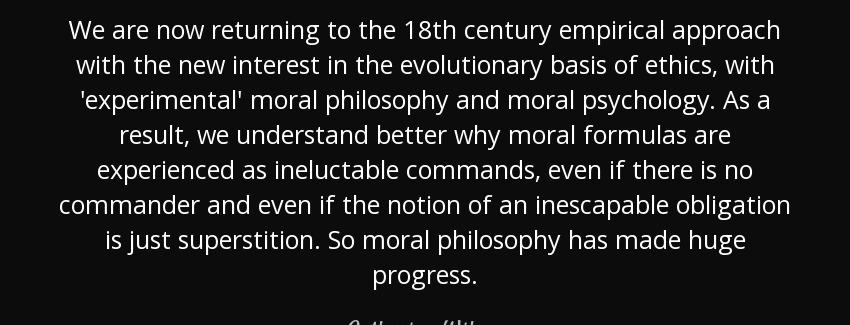famous quotes
source: - Source: www.3ammagazine.com
Topics: Philosophy, Psychology, Progress, Moral Philosophy

source: - Source: www.3ammagazine.com
Topics: Journey, Thinking, Intellectual
source: - Source: www.3ammagazine.com
Topics: Compassion, Evil, Abuse, Blackmail, Beyond Good And Evil
source: - Source: www.3ammagazine.com
Topics: Philosophical, People, Slavery, Theoretical, Pros And Cons
source: - Source: www.3ammagazine.com
source: - Source: www.3ammagazine.com
Topics: Satisfaction In Life, Drug, Trying
source: - Source: www.3ammagazine.com
Topics: Pain, Pleasure Seeking, Bread, Avoiding Pain, Bread And Cheese
source: - Source: www.3ammagazine.com
Topics: Beautiful, Lonely, Motivation
source: - Source: www.3ammagazine.com
Topics: Drinking, Inspire, Culture, Libertine, Latter Days
Topics: Goal, Groups, Philosopher
Topics: Appetite For Life, Arguing, Sometimes
Topics: Pain, Moving, Evil, Psychological Pain, Utilitarianism
Topics: Political, Principles, Ancient
Topics: Lines, Hierarchy, Management, Deputies
source: - Source: www.3ammagazine.com
source: - Source: www.3ammagazine.com
Topics: Origin Of Life, Order, Ideas, 17th Century, Epicurean
The (atomic) soul is mortal, and the best life is the one with the least pain and the most pleasure.
source: - Source: www.3ammagazine.com
source: - Source: www.3ammagazine.com
I think we do have a better understanding now of how moral thought and discourse function.
source: - Source: www.3ammagazine.com
Topics: Thinking, Understanding, Moral
source: - Source: www.3ammagazine.com
Topics: Snow, Common Sense, Water, Theoretical, Vapour
source: - Source: www.3ammagazine.com
Topics: Slavery, Common, Claims, Theoretical
source: - Source: www.3ammagazine.com
Topics: Jobs, Children, Philosophy, Encyclopedia, Science And Philosophy
source: - Source: www.3ammagazine.com
Topics: Issues, Justice, Research, Physical Science, Epistemology
source: - Source: www.3ammagazine.com
Topics: Animal, Intelligent, Mind, Intentionality, 17th Century
source: - Source: www.3ammagazine.com
source: - Source: www.3ammagazine.com
source: - Source: www.3ammagazine.com
Topics: Peers, Advertising, Human Nature
Topics: Clever, Sacrifice, Political, Sacrifice For Others
source: - Source: www.3ammagazine.com
Topics: Philosophy, Loss, Cheerful, Loss Of A Friend
Topics: Real, Men, Behaviour, Older Man, Gentlemanly
source: - Source: www.3ammagazine.com
Topics: Inequality, Higher, Bottom
Topics: Commitment, Political, Needs
Topics: Christian, Philosophy, Moral, Christian Philosophy, Interpersonal
Topics: Europe, Punishment, America, Western Europe, Nadir
Topics: Decision, Doubt, Shrimp, Human Cloning, Unclear
Topics: Children, Sacrifice, Animal, Hysterectomy, Chimney Sweeps
Topics: Two, Three, Television
